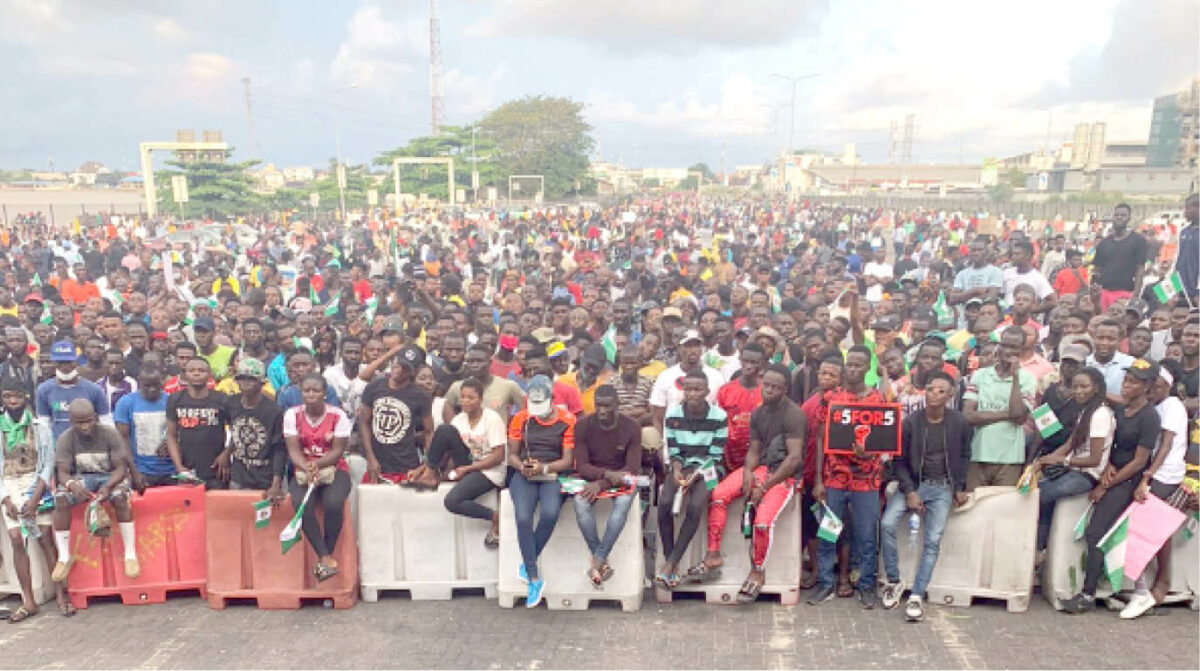Let me get right into the thick of the argument. First, while there is police brutality in Nigeria, it is not the dominant relationship between citizens and police and certainly not to the extent now widely assumed. Second, the #EndSARS protests have little to do with ‘police brutality’ in Nigeria, or with the Buhari government specifically, even for all the talk about political hijackers. Rather, the protests and the ensuing disorder are a small release from Nigeria’s ticking demographic bomb.
Now, let me disentangle all these. As nearly everyone including President Buhari recognises, the first two weeks or so of the protests were a genuine, peaceful and purposeful expression of grievances against the real excesses of the Special Anti-Robbery Squad (SARS) of the Nigeria Police. Yet, in my view, SARS is not the substantive motivation for the protests. It merely provided a spontaneous trigger to them, in much the same way that one person’s humiliating encounter with the police triggered the Arab Spring in much of North Africa in late 2010.
Indeed, police brutality is arguably the exception in Nigeria, not the norm. In my view, the dominant relationship between Nigerians and the police is transactional, not brutal. Citizens pay small bribes to the police in exchange for unruly, disorderly and sometimes illegal behaviour. On their part, policemen take these bribes and look the other way, at least most of the time among the rank and file. Of course, many policemen often overdo this and demand or extort bribes from citizens, which often leads to intimidation and illegal use of force by the police.
But if the police often overdo their hand in this transactional relationship, it does not also follow that citizens are innocent victims all of the time. Where they can, Nigerians also disrespect and intimidate the police in turn, especially among the middle and upper classes or their children and relatives. In short, policemen and women are themselves also often at the receiving end of the same kinds of intimidation and harassment they mete out on citizens most of the time.
None of this, however, is a stamp of approval for the unlawful behaviour of the police. Rather, it is a critical look at a complex social phenomenon. Furthermore, if police brutality is more an exception in Nigeria, not the rule, the exception is still a significant one. Where police brutality occurs, it tends to be quite extreme. As recent studies by Amnesty International, including one released only a few months ago, indicate, Nigeria police can be brutal indeed, particularly those attached to SARS.
The two reports document 140 cases of police brutality in Nigeria over five years where SARS operatives use methods like “hanging, mock execution, beating, punching and kicking, burning with cigarettes, waterboarding, near-asphyxiation with plastic bags, forcing detainees to assume stressful bodily positions and sexual violence”, on the pretexts of extracting “confessions” from suspects and detainees in their custody. Sometimes, according to the reports, the methods involve not mock, but actual extra-judicial executions of suspects accused of violent crime.
The majority of the victims of this brutality, the reports note further, are young people from predominantly poor and vulnerable backgrounds, and that contrary to the stated objectives of curbing crime, the real motivation is extortion. In other words, even these forms of police brutality in Nigeria mainly help to illustrate the general pattern of transactional relations between citizens and the police, and in my view, any reform measures that do not go to the heart of this relationship will fall short.
All of this leads us to the second argument that the #EndSARS protests were scarcely about police brutality per se, even if that was the immediate trigger. The protesters, I think, chose a popular but misleading hashtag, because the protests themselves are essentially about the sheer frustrations and hopelessness of being a young person in Nigeria today. And in that sense, they reflect a looming demographic bomb that has been gathering heat in Nigeria over the past few decades.
If reiteration is necessary at all, Nigeria has some of the most unfavourable conditions for young people 30 years and under. They make up more than half the population but have the fewest opportunities in jobs, income and by implication personal dignity, in a country where nine out of every 10 persons depend on someone else, not themselves. Nigerians who are 35 years and older have absorbed most of the economic gains of the past 20 years, while new ones have not been created for those coming of working age. Neither education nor artisanship now provides any firm foothold into economic security for the young, as millions of them work their shoes off miserable pay if that at all.
It is the pent up anger, frustrations and hopelessness of this cohort of Nigerians, arising out of unemployment, lack of opportunity and general social immobility that steamed off a little over the past several weeks. We are dealing here with our own version of the European 1968. You can call it #EndSARS, political high jacking, looting or whatever. But as long as the Nigerian economy and society do not expand enough to find productive engagement for the majority of its young people, all the restiveness we have seen so far this month is only the beginning. It will not matter who is in government or not if this anger is allowed to explode.

 Join Daily Trust WhatsApp Community For Quick Access To News and Happenings Around You.
Join Daily Trust WhatsApp Community For Quick Access To News and Happenings Around You.


